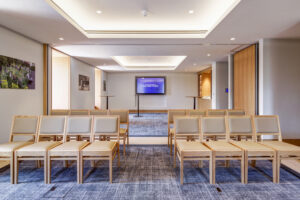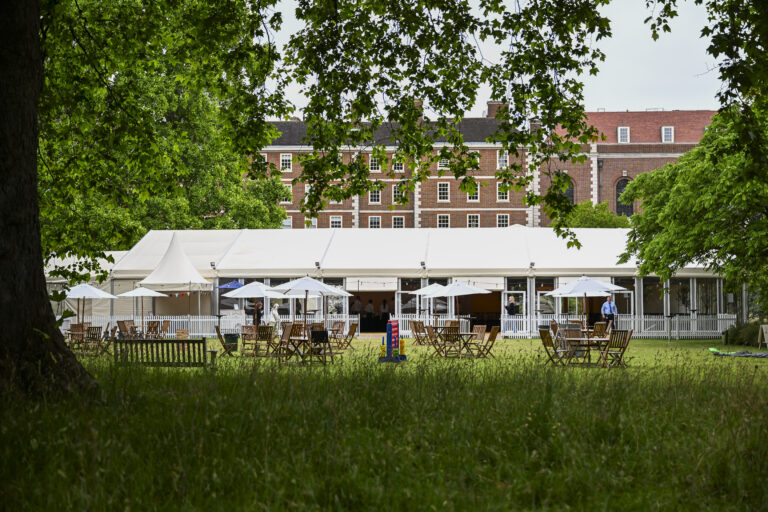
Sustainable Meetings
Five Ideas for a Sustainable Meeting in the City of London
The rapid expansion of the global event industry in the City of London over the last few decades has brought pressure on the goal line to mitigate global climate change.
There is great value to holding in person conferences and meetings as drivers of information exchange and business development, as well as vital benefits to wellbeing, but with this comes inherent high carbon intensity.
It is the responsibility of both the organiser and venue staff to consider how to offset the environmental impact of events and be conscientious in the organising and on the day to minimise the carbon footprint. According to research carried out by events consultancy MeetGreen, the average conference attendee produces over 170 kilograms of CO2 emissions per day.
We have put together 5 categories with tips for reducing the environmental impact for meetings:
Catering
A sustainable menu starts with knowing the origins of the food the venue is serving; where their ingredients are supplied from, their steps to be more sustainable and what happens to their leftover food. They may have sustainable pledges readily displayed or find out via your planner what they are doing to lessen their carbon footprint.
Some ways in which caterers can be conscientious of their carbon footprint is using seasonal and locally sourced produce, only using fish from approved MSC lists and the Good Fish Guide and working with farmers who reduce carbon by not using fertilisers.
Sustainable catering is also about quantities. As a planner ensuring you have the most accurate number of delegates that you can glean in advance and communicating this to the venue will lead to less food wastage. Ensure you don’t over-cater too. Utilise your venue planner to advise on the appropriate quantity of food and drink for your length of event.

Waste
The waste and recycling bins at venues should be clearly labelled and many venues set targets for recycling. At The Inner Temple there has been set a target of a 20% increase in recycling rates over a 5-year period.
At the start of the event, when the first speaker goes through housekeeping details, they could add a short summary about the recycling facilities available at the venue.
Another way to reduce waste is by only having reusable items at the event such as reusable crockery, cutlery, and glassware. Speak to your venue planner to ensure these will be used, as opposed to single use items.
Less than half of plastic packaging in the UK was recycled in 2021 and recycling uses energy so it is still better to have reusable items rather than recycling.
Going Digital
The ubiquity of paper is rapidly declining and many venues have now gone paperless. Notebooks have been widely provided for guests in the past for meetings. However, rather than providing notebooks and pens for your event which delegates might not keep, suggest that delegates bring along laptops or ipads to take notes on. This can be built into the journey when delegates are invited with an introduction on how you are trying to reduce paper.
Encourage attendees to offset their carbon emissions from travel to the event by investing in carbon offset projects. You can work with a third-party carbon offset provider to calculate the emissions from attendee travel and then offer attendees the option to offset those emissions by investing in renewable energy projects or reforestation initiatives.
Consider offering virtual attendance options for those who are unable to travel to the event. This can reduce the carbon emissions associated with travel and can also make the event more accessible to a wider audience.
Heating & Electricity
Check if your venue is doing anything to reduce the energy used through heating and recycling. For instance, are there any solar panels or LED light bulbs?
At The Inner Temple we have high levels of thermal insulation, and we apply renewable air source heat pump technology. Solar roof panels have been installed to offset carbon production and solar control of rooflight glazing to minimise heat gain and glare. Natural daylight is maximised where appropriate.
A small step you can take as the meeting organiser is to turn the lights off on exit from the meeting. If your event finishes early or venue staff are busy, the lights may not otherwise get turned off for a while. Equally if you have any laptops plugged in, turn off the switches when these are unplugged.

Travel & Accommodation
Encourage attendees to use public transport to get to the event by providing information about the nearest tube or bus stations, along with maps and directions. You could even offer discounted or free travel on public transport for attendees to encourage them to choose this option over driving.
If the clients are from different parts of the UK or abroad, find out if there are local hotels to the venue and identify if those hotels have green initiatives, such as energy-efficient lighting, water-saving measures, and recycling programs. Encourage attendees to choose these hotels and provide information about their sustainability initiatives.
Overall, hosting a sustainable meeting is an excellent way to demonstrate your commitment to environmental responsibility and inspire others to do the same. By implementing these ideas and working with your venue and attendees, you can reduce the carbon footprint of your event and make a positive impact on the planet.
At The Inner Temple we are taking steps to reduce the environmental impact with an effectively management plan to reduce carbon emissions and measurable 5-year goals are set. Enquire today to find out how we can assist you towards holding a sustainable meeting in the City of London.

